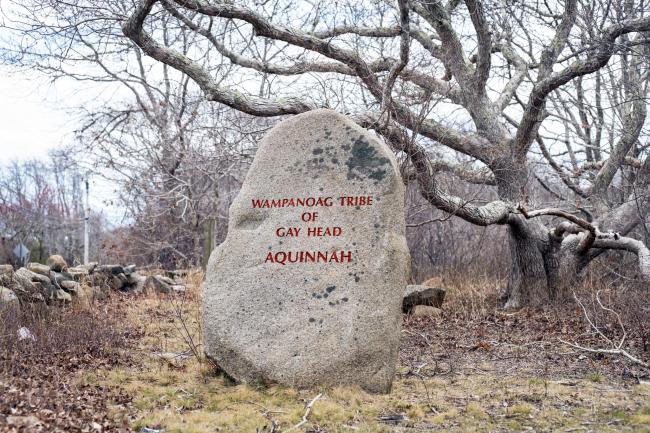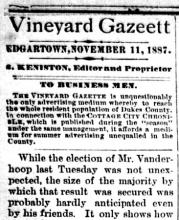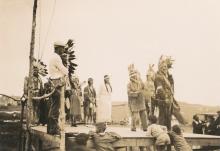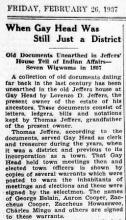The Wampanoag Tribal Council of Gay Head approved a plan last night that could lead to settlement of the seven-year-old suit claiming Indian ownership of Gay Head town lands.
The 115 to 60 margin in favor of settlement of the suit is being contested by a party within the tribe that favors suing for the entire town. But tribe leaders say they will move toward settlement.
Votes from balloting this weekend were counted at the tribal council offices in Gay Head last night with members of both pro-settlement and anti-settlement groups tabulating the paper ballots.
When the counting was done, Beatrice Gentry, an opponent of the proposed settlement plan, challenged 17 votes that were delivered yesterday on the Schamonchi, 12 votes from people not on the list of tribe members, 10 votes postmarked after the Sept. 26 deadline, and 13 that were not folded lengthwise in their envelopes, according to the printed directions. The 115 to 60 count excluded these challenged votes.
“It’s illegal. It’s illegal,” Bertha Giles, another settlement opponent, said angrily.
Tempers flared as Mrs. Gentry and Mrs. Giles argues with tribal council president Gladys Widdis and tribal council director Donald Widdiss. Mr. Widdiss said he expected the protest, and denied that any tribe members had been refused a chance to vote, as Mrs. Giles charged.
It was clear last night that the protests by settlement opponents would not deter the tribal leadership from seeking a settlement of the suit. Mr. Widdis and other pro-settlement tribal council members were jubilant last night about the vote’s result.
Last night’s vote was the first taken by the full Wampanoag Tribal Council membership on any proposal to settle the land claim suit.
“It’s obviously a substantial vote for settlement,” Mr. Widdis said last night.
Reaction to the vote from members of the Gay Head Taxpayers Association, the group that stepped into the suit to bargain with the tribe on behalf of Gay Head non-Indians, was cautiously optimistic. Taxpayers association members said there are still some potentially complicated questions to be resolved before a final settlement package is drafted, but they called the tribe’s voice a positive move.
“I have all along subscribed to the view that a settlement is far preferable to a lengthy, expensive and vitriolic lawsuit. I hope we can move to a final settlement of all the problems created by the tribal lawsuit,” said Robert Stutz, a taxpayers association negotiator.
Lawrence Mirel, a lawyer for the taxpayers association, said any settlement will have to clearly extinguish the chance of future tribal land claims.
“The terms are not the question. It’s primarily the ability to assure that nothing like this happens again,” Mr. Mirel said.
The attempt by 43 Gay Head Indians to intervene in the original tribal suit as individuals and claim the entire town as Indian land could complicate the push to a final settlement, Mr. Mirel said. Another complicating factor is whether the attorney general’s office will accept the proposed settlement terms, he said.
Stephen Shultz, administrative counsel to Attorney General Francis X. Bellotti, said yesterday: “We will have to study it and see if it is acceptable to us.”
Mr. Widdis said yesterday he did not see how the taxpayers association could back away from a package arrived at through the negotiating process.
Thomas Taureen, lawyer for the tribe, described the vote for the tribe last night as “a mandate for settlement.” He said the package voted on was “verbatim” what the taxpayers association proposed in February.
Selectman Jeffrey Madison said last night he will be on the phone today to tell Mr. Schultz and members of the taxpayers association that the settlement plan should be supported.
“I hope everybody can see that this is really and truly what should happen,” Mr. Madison said. “It seems to me this is the only logical way to proceed.”
Mr. Madison, who has pushed hard for settlement of the suit, was clearly overjoyed by the vote. “It’s super,” he said.
It may take some time, however, before a final settlement is worked out. Moses and Hannah Malkin, key members of the taxpayers association negotiating group, are traveling in China, Mr. Stutz said. And it will take time for the attorney general’s office to study the proposed settlement plan.
There is also the question of the 43-member Indian group seeking return of the entire town to the tribal council, against the tribal council leadership’s opposition. United States District Court judge John McNaught will hear arguments on the faction’s motion to intervene on Nov. 5. The tribal council, the state, the town, and the taxpayers will oppose the expansion of the suit.
The Wampanoag Tribal Council sued in November 1974, claiming that the town of Gay Head had violated the federal Indian Non-Intercourse Act of 1790 when it took over the 238 acres of tribal Common Lands. But the same legal principle could be expanded to cover the entire town, which was created out of a state Indian district in 1870 without Congressional approval. The Indian claim has thus clouded titles to all private land in Gay Heead, and given the tribal council leverage in bargaining for additional lands.
Working against the Indian claim is the fact that a court trial would focus on whether the Gay Head Indians acted as a tribe, according to certain strict legal tests, at those times when land was allegedly taken from them in violation of the law. The Gay Head Wampanoags are not a federally recognized tribe.
The settlement plan voted by the tribe has the following provisions:
The tribe will establish a land corporation which will receive control of 238 acres of Common Land now owned by the town.
Three parcels of buildable land, amounting to about 175 acres, will be purchased with funds to be authorized by Congress from the trustees of the bankrupt Strock Development Corporation.
The town will sell the 5.5-acre Cook lands at the head of the Gay Head herring creek to the tribal land corporation. This land will not be considered part of the settlement land, and will be subject to taxation and foreclosure.
If the owners of the so-called Menemsha Neck Lands will sell their properties to the tribe, the tribe will seek federal funding to buy the land at fair market value.
Congress will enact legislation eliminating all claims to land in Gay Head that could be bought under the federal Indian Non-Intercourse Act or any other federal law governing Indian affairs. This will not affect claims individual Indians may have under state law.
The town will keep control of a 50-foot strip of shoreline adjacent to the Common Lands. Both the tribe and the taxpayers will have legal recourse if the town alters the management of the beaches in a way unacceptable to either party. The object of this provision is to continue the free access to the beaches by Indian and non-Indian Gay Head residents alike.
The settlement lands will not be subject to taxation, but the tribe will make payments to the town in lieu of taxes. If those payments fall three years behind, the town may take a lien on the land and improvements and recover the payments by leasing the land to the tribe. The town cannot take over the title to the tribal settlement lands.
The tribe will have the right to regulate hunting on its lands by means other than firearms or crossbow. The state crossbow and firearms regulations will apply in the tribal lands.
A professional land use plan will be drawn up for the settlement lands. The Common Lands will remain in their natural state. The plan for the buildable land will become part of Gay Head zoning bylaw, with the tribe’s approval necessary for any amendments.
The settlement will not provide for federal recognition of Gay Head Wampanoags as a tribe.
When the settlement is ratified by Congress, the state legislature, the town and the taxpayers, the tribe will dismiss its suit.











Comments